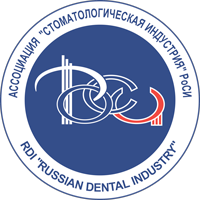DOI:
10.37988/1811-153X_2024_4_34Determination of the effectiveness of the remineralizing drug on tooth enamel and dentin by scanning microscopy after a chemical bleaching procedure: an experimental non-randomized study
Downloads
Abstract
In our days, tooth discoloration is one of the common problems for people of different age and population groups. This is a fairly common and polyetiological type of pathology of hard dental tissues, which does not have a universal method of treatment. The purpose — study the need to use enamel-sealing liquid on dental tissue after the procedure of chemical teeth whitening.Materials and methods.
24 teeth extracted for orthodontic indications were used in the experiment. The procedure of chemical teeth whitening was carried out using Opalescence Xtra Boost system. Remineralizing therapy was carried out using enamel-sealing liquid. The elemental composition of enamel and dentin was studied by energy dispersive spectroscopy.
Results.
At traditional bleaching without application of remineralizing preparation and at bleaching with single application of liquid the width of dental tubules markedly increases, thus increasing the permeability between enamel and dentin. With repeated application of liquid, there is a decrease in the width of the dental tubules and hence a decrease in the entrance gate for infection.
Conclusion.
The use of liquid helps to remove organic plaque from the tooth surface, to preserve and replenish the composition of microelements that provide tooth strength, to reduce the width of dental tubules and, consequently, to reduce hypersensitivity of teeth.
Key words:
chemical whitening teeth, sensitivity of teeth, enamel-sealing liquidFor Citation
[1]
Nefedova I.F., Brehov S.D., Magsumova O.A., Postnikov M.A., Chigarina S.E., Ryskina E.A. Determination of the effectiveness of the remineralizing drug on tooth enamel and dentin by scanning microscopy after a chemical bleaching procedure: an experimental non-randomized study. Clinical Dentistry (Russia). 2024; 27 (4): 34—39. DOI: 10.37988/1811-153X_2024_4_34
References
- Mashko O.A. Aesthetic considerations in prosthetic dentistry. Scientific Review. Medical sciences. 2017; 4: 54—57 (In Russian). eLIBRARY ID: 28781651
- Titova O. Age aspects of treatment of teeth discoloritis. Actual Problems in Dentistry. 2019; 4: 61—65 (In Russian). eLIBRARY ID: 42364558
- Titova O., Reshetnikova Y., Trunin D. Study of the stability of covering of tooth enamel with decorative lacquer with diseases of teeth. Actual Problems in Dentistry. 2018; 2: 52—55 (In Russian). eLIBRARY ID: 35295785
- Luzganova E.V. Modern approaches to teeth bleaching and oral hygiene rules. Nauka 21 veka: voprosy, gipotezy, otvety. 2017; 1 (22): 14—17 (In Russian). eLIBRARY ID: 28298689
- Gilmiyarov E.M., Ryskina E.A., Magsumova O.A., Polkanova V.A., Alsaeedi A.H. Change of indicators of oral fluid affecting mineral exchange of hard tooth tissues after in-office teeth whitening. Medical and pharmaceutical journal Pulse. 2019; 12: 50—54 (In Russian). eLIBRARY ID: 41849743
- Lutskaya I.K. The current state of the problem of teeth whitening. International reviews: Clinical practice and health. 2019; 1 (33): 46—54 (In Russian). eLIBRARY ID: 38472875
- Akulovich A., Shishelova A. Tooth sensitivity: the problem and its solution from the point of view of physiology. Digital Dentistry. 2016; 2: 68—77 (In Russian). eLIBRARY ID: 44563000
- Bondarik E.A., Polyanskaya L.N. Modern methods of teeth bleaching. Sovremennaya stomatologiya (Belarus). 2011; 2 (53): 37—41 (In Russian). eLIBRARY ID: 17013634
- Bazhutova I.V., Magsumova O.A., Frolov O.O., Timchenko E.V., Timchenko P.E., Trunin D.A., Komlev S.S., Polkanova V.A. Raman spectroscopy analysis of dental enamel organic and mineral composition: an experimental non-randomised study. Kuban Scientific Medical Bulletin. 2021; 4: 118—132 (In Russian). eLIBRARY ID: 46458976
- Magsumova O.A., Polkanova V.A., Timchenko E.V., Volova L.T. Raman spectroscopy and its application in different areas of medicine. Stomatology. 2021; 4: 137—142 (In Russian). eLIBRARY ID: 46390890
- Karaarslan E.S., Özmen Z.C., Aytac F., Bicakci A.A., Buldur M., Aydogan L., Hologlu F., Özkocak B. Evaluation of biochemical changes in dental tissues after different office bleaching methods. Hum Exp Toxicol. 2019; 38 (4): 389—397. PMID: 30526070
- Rodríguez-Martínez J., Valiente M., Sánchez-Martín M.J. Tooth whitening: From the established treatments to novel approaches to prevent side effects. J Esthet Restor Dent. 2019; 31 (5): 431—440. PMID: 31448534
- Wu S., Chen Y., Zhang J., Chen W., Shao S., Shen H., Zhu L., Ye P., Svensson P., Wang K. Effect of low-level laser therapy on tooth-related pain and somatosensory function evoked by orthodontic treatment. Int J Oral Sci. 2018; 10 (3): 22. PMID: 29967411
- Bichikaeva Z. Use of medications based on amorphous calcium phosphate for enamel remineralization after teeth bleaching procedure. Aesthetic Dentistry. 2018; 3—4: 122—125 (In Russian). eLIBRARY ID: 42895512
Downloads
Received
November 18, 2023
Accepted
December 5, 2024
Published on
December 17, 2024









